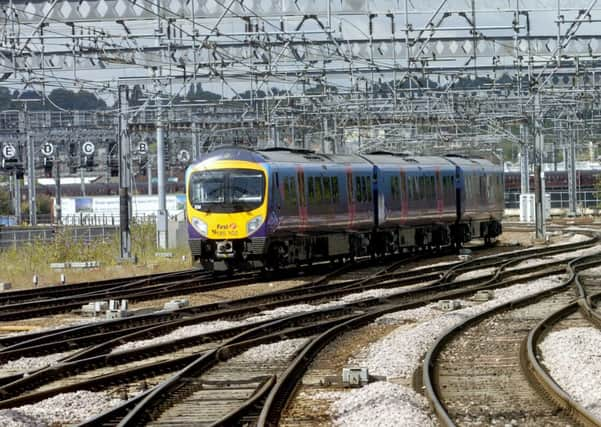Tough new targets set for trains to operate on time


Nine out of 10 trains must run on time for all regional, London and south-east England and Scottish services for the five-year period starting in April 2014.
On long-distance routes, First Great Western must run 90 per cent of trains on time while a target of 88 per cent has been set for the two main London to Scotland routes – the East Coast and West Coast main lines.
Advertisement
Hide AdAdvertisement
Hide AdAnnouncing rail funding for the 2014-19 period, the Office of Rail Regulation (ORR) said that by 2019 fewer than three in 100 trains on the West Coast line and around four in 100 on the East Coast line should be hit by cancellation or delays of more than 30 minutes.
The ORR also increased, by £32m, the funding to close around 500 level crossings and improve safety at hundreds more of the highest-risk crossings. Total funding will now be £109m.
The extra funding comes a short time after the House of Commons Transport Committee heard about concerns over level crossing safety from the parents of Olivia Bazlinton, 14, who, with her friend Charlotte Thompson, was killed at a crossing at Elsenham, Essex, in December 2005.
The NR funding includes around £250m to help improve the safety of track workers and to be invested in new equipment and safer working practices.
Advertisement
Hide AdAdvertisement
Hide AdThe ORR has also approved an extra £571m to upgrade structures such as bridges and tunnels.
In total, NR will receive more than £21bn over the next five years to fund the day-to-day running of the rail network. The ORR will require the company to bring down the cost of operating the network by around 20 per cent,
The regulator has given the green light to more than £12bn worth of enhancements to Britain’s rail network to ease congestion and improve performance.
Within this, projects totalling more than £7bn do not yet have clear delivery plans or costs. The ORR is giving NR until March 2015 to work up plans before approving the funds.
Advertisement
Hide AdAdvertisement
Hide AdThe regulator is also proposing that rail users and train operators are given a bigger role, putting passengers at the heart of decisions on how the railway is improved.
Also, the ORR will put additional checks in place to monitor the company’s progress on making the network more resilient to bad weather and climate change.
ORR chief executive Richard Price said: “Network Rail has made great strides in improving safety, performance and efficiency on Britain’s railways.
“Supported by significant levels of funding from governments, working more closely with the rest of the industry, and learning important lessons from the past, the company is capable of delivering more for customers and taxpayers.”
Advertisement
Hide AdAdvertisement
Hide AdHe added: “This plan for Britain’s railways between 2014 and 2019 – informed by the public, consumer groups, governments and the industry – requires a safer, higher-performing and more-efficient railway.
“More level crossings will be upgraded or closed; passengers will enjoy better punctuality and suffer fewer cancellations; customers should have a say in shaping billions of pounds of new investment on the network; and the company will continue to bring down the day-to-day costs of running the railways.
“With increased levels of funding in vital areas such as safety and closer monitoring from the regulator, we expect Network Rail to build on past successes and beat the challenges that we have set.”
NR now has until February 7, 2014 to respond in detail and accept or reject the ORR’s determination.
Advertisement
Hide AdAdvertisement
Hide AdNR’s chief executive, Sir David Higgins, said: “The next five years for the railway will prove to be a critical challenge.
“A challenge to continue to respond to rising passenger demand and our need to grow and expand the network while at the same time juggling the ever harder challenges of improving performance, reducing cost and delivering huge investment projects from which substantial social and economic benefits flow.”
Martin Abrams, public transport campaigner for Campaign for Better Transport, said: “The rail expansion in this settlement will be welcome to passengers and will also take lorries off our roads.
“The plan also sets some ambitious and encouraging targets to improve things.
Advertisement
Hide AdAdvertisement
Hide Ad“What it also shows, though, is that the cost of running our railways is actually falling whilst train fares are still increasing much faster than inflation.”